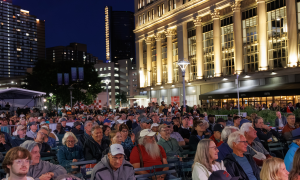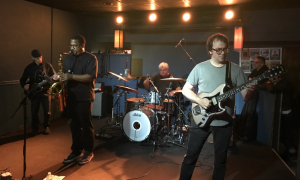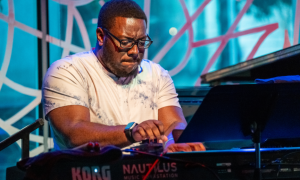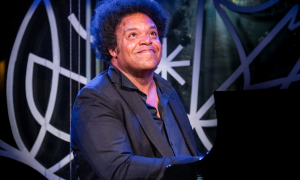Home » Jazz Articles » Live Review » 30th Annual Detroit International Jazz Festival
30th Annual Detroit International Jazz Festival
Sean Jones / Dave Brubeck Quartet / Brian Auger's Oblivion Express
Alfredo Rodriguez / Dennis Coffey / Wayne Shorter Quartet
Chuchito Valdes / Stefon Harris & Blackout
30th Annual Detroit International Jazz Festival
Detroit, Michigan
September 4-7, 2009
The Detroit International Jazz Festival celebrated its 30th anniversary over Labor Day Weekend 2009, using the occasion to honor one of Motown's greatest jazz families. Adopting a "Keepin' Up With the Joneses" theme, the festival shone a light on the legacy of 
Hank Jones
piano1918 - 2010

Elvin Jones
drums1927 - 2004

Thad Jones
trumpet1923 - 1986
Pianist Hank Jones, the only surviving brother of the three, kicked off the festival with his trio on Friday night, and music and talks throughout the weekend focused on the impact of each Jones brother. Additionally, there was a host of "family reunions" scheduled: 
Dave Brubeck
piano
1920 - 2012
Brubeck Brothers Quartet
band / ensemble / orchestra
Jimmy Heath
saxophone, tenor
1926 - 2020
Albert Tootie Heath
drums
1935 - 2024
John Pizzarelli
guitar
b.1960
Bucky Pizzarelli
guitar
1926 - 2020
Larry Coryell
guitar
1943 - 2017
Pete Escovedo
percussion
b.1935
Clayton Brothers
band / ensemble / orchestra
Brian Auger
organ, Hammond B3
b.1939
September 4: Hank Jones


Hank Jones
piano
1918 - 2010
Some exceptions to this formula were the trio's take on 
Ben Tucker
bass, acoustic
b.1930
Bob Dorough
vocals
1923 - 2018
George Mraz
bass
1944 - 2021
Carl Allen
drums
b.1961
Jones, nimble throughout the set, fashioned an especially tender interpretation of Thad Jones' "A Child Is Born," and cut from tender to a keep-the-party-going Latin beat on the encore, Thelonious Monk's "'Round Midnight." Would that we could all be so defiant as the nonagenarian and push aside time at last call.
September 4: Corea, Clarke & White
The headline act for the evening was introduced as "
Chick Corea
piano
1941 - 2021

Bassist 
Stanley Clarke
bass
b.1951
Lenny White
drums
b.1949
All this is not to say that Corea sat idly by, resting on Steinway laurels. His solo piano opened many of the tunes, as he worked from soft melodies or cutting block chords into jumping, articulate statements that traded his famous electric keyboard hum for the more bracing tones of the acoustic ivories. During even his most forceful attacks, Corea's hands would float up from the keys, hover for the slightest instant, then lovingly descend, like pollinating bees—it was difficult at times to reckon the soft motion with the rash of sounds it produced. And his interplay with Clarke, especially on "Straight No Chaser," was chest-expanding, the two musicians looping in completion of or engendering one another's thoughts.

After a handful of tunes, the trio returned to the stage for an anthemic yet playful take on Corea's "Spain" that ended with the pianist conducting a call and response from the crowd: the thousands in attendance singing several of Corea's improvised bars back to him. Detroit had certainly been warmed up for the weekend.
September 5: Sean Jones
Not only has trumpeter 
Sean Jones
trumpet
b.1978

Opening with two original compositions, "Transitions" and "Life Cycles" (the latter inspired by Microsoft Windows' four-tone boot-up and shutdown music), Jones and saxophonist Brian Hogans led the group in establishing a melodic yet riff-heavy foundation in the hard bop mold. Jones, who switched to flugelhorn for the second number, opened each of his solos with soft, heat-tempering breaths—contemplative but kinetic—that brushed clean his canvas. He then filled it again with bright slashing colors, long broad strokes and rainbow spit. The sleepy-eyed Hogans favored halting, Bird-like bop passages and R&B swoons that were picked up by pianist 
Orrin Evans
piano
b.1975
On 
John Coltrane
saxophone
1926 - 1967
The group followed with two melodic numbers, Hogans' "Summer's Spring," into which Jones worked the tender, fluttering warble of a newborn chick, and Jones' "Mama," a soulful dedication to the trumpeter's mother. They closed with a last hard bop number, "The Storm," but the hurricane had already blown in their masterful, passionate reading of Coltrane.
September 5: Dave Brubeck Quartet
Iconic pianist Dave Brubeck's best musical years are certainly behind him. At 88, no one's expecting him to make a 50th-anniversary follow-up to "Time Out" (Columbia, 1959) that will once again knock the jazz world off kilter. Some may turn out to his shows simply to see the man—to pay homage—while others are perhaps more morbidly curious to see what he's got left.
Well, the answer is, quite a bit. While not as dexterous as he once was (he shied away from extended bits on his groundbreaking "Blue Rondo a la Turk" and "Take Five," for example), he knows how to lead a band and to work within himself to paint beautiful, emotive music with surprising misdirections.
A pretty, minimalist "Mood Indigo" jumbled time dreamlike (and, to be sure, Brubeck-like), leading organically into a "Take the A Train" that was carried primarily by saxophonist 
Bobby Militello
saxophone, alto
b.1950

Brubeck's sons, trombonist Chris and drummer Dan, and their band, who had played earlier in the day, joined Dad for three pieces, including "Blue Rondo" and "Take Five." It was a family affair welcomed and shared by the crowd, and one that added interesting new wrinkles to the Brubeck classics, most notably in the adventurous harmonica work of Peter "Madcat" Ruth and in the extended, furious drum solo from Dan on the "Take Five" closer. Yet, throughout, it was Dave Brubeck's contemplative, still exploratory and exuberant tapping of the keys that sparked the music and showed that the master hasn't yet pulled all of the rabbits out of his hat.
September 5: Brian Auger's Oblivion Express
There's no resisting Brian Auger and his Oblivion Express. Now working with his offspring, singer Savannah and drummer Karma, and bassist Andreas Geck, the fiery 70-year-old keyboardist is still, in his own words, "out here kicking your ass!" The Oblivion's music is hard-charging soul, sparking a thump and expansion in even the most marble of chests. If you don't loose a scream, a fist pump, a "hell yeah!" or, at least, some serious foot tappin' during an Oblivion set, you're simply not human.


Herbie Hancock
piano
b.1940

And at the edge—the head of the table, as it were—sat or stood Pops, pumping out swamp-fed electric soul, blues and funk, sweating and grunting over his work one moment, then turning to eye the crowd in the next, gauging their reaction—their groove—then digging into the teeth of his beast to take the groove higher.
September 6: Alfredo Rodriguez
23-year-old pianist 
Alfredo Rodriguez
piano
b.1985
Quincy Jones
arranger
1933 - 2024
Having been introduced to Thelonious Monk's music just six years ago, Rodriguez has already internalized Monk's jarring mode of attack. He says he most admires Monk's constant thirst for exploration—always a wonderful sentiment to hear from a young artist in this marketing-crazed world that prefers to stamp out the same slick product.

Rodriguez began his set here in the somber, melancholic mood of the Russian classicists that after a time was sparked by the island rap of a percussion foot pedal. The piece then opened, inviting influences from around the globe, which Rodriguez pounded passionately into his instrument or stroked from it with an aggressive sweeping of the keys.
The second number was more wistful and melodic, often finding Rodriguez shrugging his shoulders in contemplation or in agreeable resignation to where the music was telling him to go. He remained bent over the keys for several moments after the piece had ended, still transfixed by its spell.
The third piece was his most Monkian, opening with a repeated right-hand figure that freed the left to explore the entire stretch of keys in mostly clunky, rattling chord shots. He went on through a sort of Cuban ragtime that escalated into a series of power chords suddenly tempered on a dime by soft, but full touches. He stood for his fourth piece and worked the strings in the Steinway's belly, while playing the keys with his free right hand. Sitting, he again employed the percussion pedal in spots and, amidst a fury of angular exploration, continually found pastures of pure melody, touching on snippets of American popular song that thread together all in attendance and brought them along for the journey, humming.
After two more pieces in which he displayed an unfaltering inventiveness and tickled tender ballads into roiling cauldrons of blocked time, Rodriguez returned to the stage to spin "Frere Jacques" from a work initially rendered as classically hewn crystal. The sudden return to childhood sent many in the audience into giggles. It was Rodriguez's most melodic, recognizable number and in its development cast shadows on its initial innocent humor, stretching the childhood rhyme through adolescence and on into the often darker, but deeper and more meaningful, strains of adulthood.
The set was an introduction to a young man who is already a major artist.
September 6: Dennis Coffey
 Counter the above with the flashy, fiery guitar work of Motown veteran
Counter the above with the flashy, fiery guitar work of Motown veteran 
Dennis Coffey
guitar
b.1940
But while he then turned his attention to Motown hits like "My Girl" and "Just My Imagination"—smash records on which Coffey played and is in no small part responsible—his routine grew formulaic. His skill on the strings was impressive, but the metal blaze revealed itself as an artificial fire, flashing its orange, red and yellow flames in programmed order. The initial thrill sank into tired—if groovy—repetition. Unlike Rodriguez and 
Wayne Shorter
saxophone
1933 - 2023
September 6: Wayne Shorter Quartet
 Saxophonist Wayne Shorter has all the star power a jazz personality could want, and no one would fault him for standing at stage's edge, blowing his fame front and center over a band left to the shadows. But Shorter is a musician, not a celebrity. He prefers to keep himself in the shadows as well—or, at least, in equal lighting with his band—nestling in to the curve of the piano and playing his sax only when it's proper—when the music requires and is moved by it.
Saxophonist Wayne Shorter has all the star power a jazz personality could want, and no one would fault him for standing at stage's edge, blowing his fame front and center over a band left to the shadows. But Shorter is a musician, not a celebrity. He prefers to keep himself in the shadows as well—or, at least, in equal lighting with his band—nestling in to the curve of the piano and playing his sax only when it's proper—when the music requires and is moved by it.
In fact, if there was a star in the band on this night—a musician whose passion for playing so affected his physical presence—it was unquestionably drummer 
Brian Blade
drums
b.1970
Danilo Pérez
piano
b.1966
That said, Shorter's band was of a piece, as was their music. No performer, no instrument, jettisoned from the music to have an individual say. All was interwoven. Shorter was economical in the early going, where the temptation for a lesser artist would have been to blow fast and shine. Instead, the master saxophonist fashioned groupings of three or four notes, followed by ample space. His eyes peered out, seeing notes instead of adoring faces, and in those first stages his brain made more noise than his sax as he figured and refigured what lay ahead and how best to sculpt it—now, tonight, this time.

The rock in a group of younger, more physically vibrant players, Shorter gradually worked up the steam, though never giving way to extended passages of personal glory. Perez, bassist 
John Patitucci
bass
b.1959
The riffs, the themes (if such they can be called) were mostly simple, repeated notes, but well-chosen. There was a gravitas to the music leavened by a vibrant—danceable—percussive rollick and chest-bending bass lines. An improvised creation of the highest order that employed musical tools and voices, and technical proficiency as automatic as breathing, to express what couldn't be expressed outside of music. To confront visceral planes of human experience and open them for the audience, rather than staging a musical track meet.
Shorter and company did not return to the stage for an encore for they'd already completed their emotionally riveting and depleting suite of music. Taking on some kind of command showstopper was not in order. It wasn't that kind of show.
September 7: Chuchito Valdes
After three wonderfully mild, sunny days, the rain moved in on Monday, opening umbrellas up and down the cement rows of the Mack Avenue Pyramid venue just before Cuban pianist 
Chuchito Valdes
piano
b.1966

Backed by Emilio Valdes on drums, Frankie Ocasio on congas and Jonathan Paul on bass, Chuchito came out determined to drive away the drizzle with vibrant island sun. Ever retaining a heavy Cuban flavor in his playing, the pianist also unpacked bop and classical techniques to lift his relentless attack of the keys from simply the accompaniment for dance or mojitos into thrilling, dimensioned artistic statements. On occasion, as when the band had a go at "Take the A Train" (a festival staple for many acts this year), the cubania would spring almost entirely from Ocasio and Emilio Valdes' skins, freeing Chuchito to explore modern jazz motifs that, nevertheless, led back to and seamlessly picked up the Latin beat.
Chuchito's showmanship was also on full display, as when he would stand to conduct a bass solo from Paul, rush up the keys in fitful arpeggios only to run out of ivory and trill off into midair, or slip from the bench in the passion of his playing, yet continue pounding, his back pressed to the edge of the bench and arched back over it. The crowd loved it, mostly because it was authentic—a natural extension of the same mischievous personality that displayed itself in the music: ever dancing, ever clowning, because comedy and joy are as worthy of an artist's examination as tragedy and terror and more vital to the continuation of life.
September 7: Stefon Harris & Blackout

Vibraphonist and marimba player 
Stefon Harris
vibraphone
b.1973
Buster Williams
bass, acoustic
b.1942
Stevie Wonder
vocals
b.1950
Keyboardist 
Marc Cary
piano
Terreon Gully
drums
Ben Williams
bass, electric

Like Shorter on the evening before, Harris placed himself among the band, directing a complete musical concept. To be sure, his juggling of the mallets over the bars of his instruments was singularly impressive, but for all his expertise and individual mastery he never divorced himself from the group effort. As the set wound to its close, the clouds once again began to drip. But there was nothing leaking from the futuristic fusion of Blackout's cohesion. And with the stages across the festival all soon to go dark for another year, the set from Harris' band served as a fitting coda to a fabulous collective experience.
Photo Credit
Matt Marshall
Tags
Comments
PREVIOUS / NEXT
Support All About Jazz
 All About Jazz has been a pillar of jazz since 1995, championing it as an art form and, more importantly, supporting the musicians who make it. Our enduring commitment has made "AAJ" one of the most culturally important websites of its kind, read by hundreds of thousands of fans, musicians and industry figures every month.
All About Jazz has been a pillar of jazz since 1995, championing it as an art form and, more importantly, supporting the musicians who make it. Our enduring commitment has made "AAJ" one of the most culturally important websites of its kind, read by hundreds of thousands of fans, musicians and industry figures every month.







 Buy Now
Buy Now



















